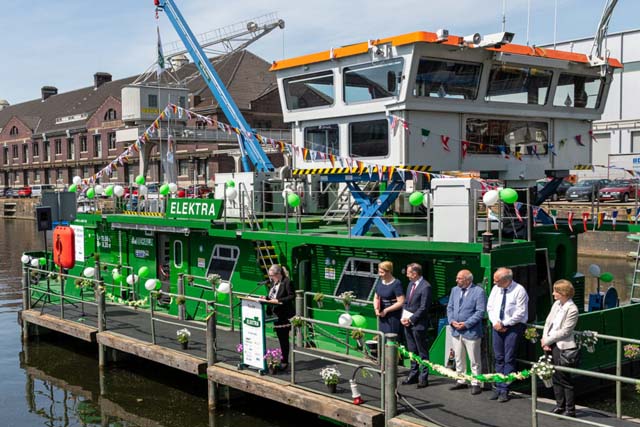A naming ceremony has been held for ‘Elektra’, believed to be the first zero-emission pushboat to be built, at the Hermann Barthel shipyard in Derben, Germany.
The ceremony marked the end of a two-year construction period and the transfer to Berlin’s Westhafen for testing to begin.
Petra Cardinal, MD of Berliner Hafen- und Lagerhausgesellschaft (Behala), welcomed around 250 guests from politics and authorities, as well as from the project partners and suppliers, the project sponsor and project coordinator, from the port industry and various associations, the press, members of the supervisory board and the workforce.
Federal Minister Dr Volker Wissing said: “The Elektra is a flagship project: It is the world’s first push boat that combines a battery-electric drive with hydrogen and fuel cell technology. The entire project is a blueprint for climate and environmentally friendly inland shipping and a real pioneering achievement, not only technically but also in terms of regulation.”
Governing Mayor of Berlin, Franziska Giffey, said: “The world’s first zero-emission push boat is the impressive result of collaboration between stakeholders in shipbuilding and power and propulsion technology. I am particularly pleased that a lot of Berlin’s inventive spirit has flowed into the development and construction of Elektra. This lighthouse project is an example of how innovative ideas can be used to improve the climate on our waterways in the long term. Berlin wants to be a pioneer here.”
The vessel has been developed by Behala and shipyard Hermann Barthel, in partnership with Ballard Power Systems (fuel cells), Argo-Anleg (hydrogen system), SER Schiffselektronik Rostock (electrical system), EST-Floattech (battery system) HGK Shipping (nautical operation) and TU Berlin. As the first emission-free ship of its type, Elektra will serve as a role model, because this energy system is designed in such a way that it can be transferred to a large number of inland waterway and coastal ship types.
Waste heat from the fuel cells is used through consistent water cooling and the rooms are heated via a brine heat pump. The use of a self-developed energy management system and a driving assistant support the skipper and logistician in planning the assignments and carrying out the transport.
With 750 kg of usable gaseous hydrogen on board at a pressure of 500 bar and a battery capacity of about 2,500 kWhs, the ship has a range of around 400km when pushed together with the loaded heavy lift lighter Ursus. Therefore, in a typical voyage from Berlin towards the Rhine/Ruhr, Hamburg and Szczecin, only one additional land station is required to supply the Elektra with hydrogen and electricity in addition to the Westhafen. The first 500kW charging stations for the hydrogen tanks and batteries will begin operation in 2023 in Berlin’s western port and the port of Lüneburg.
TU Berlin has concluded a supply contract with the Mittelelbe industrial and commercial park / H2 Green Power & Logistics GmbH for the filling and transport of the tank systems (Multiple Energy Gas Container – MEGC) with green hydrogen. The MEGC can be exchanged with the onboard crane.
With a total budget of about €14.6m, the project is funded by the Federal Ministry for Digital Affairs and Transport (BMDV) and project management agency Jülich (PTJ) with supervision and coordination by the National Organization for Hydrogen and Fuel cell technology (NOW).



